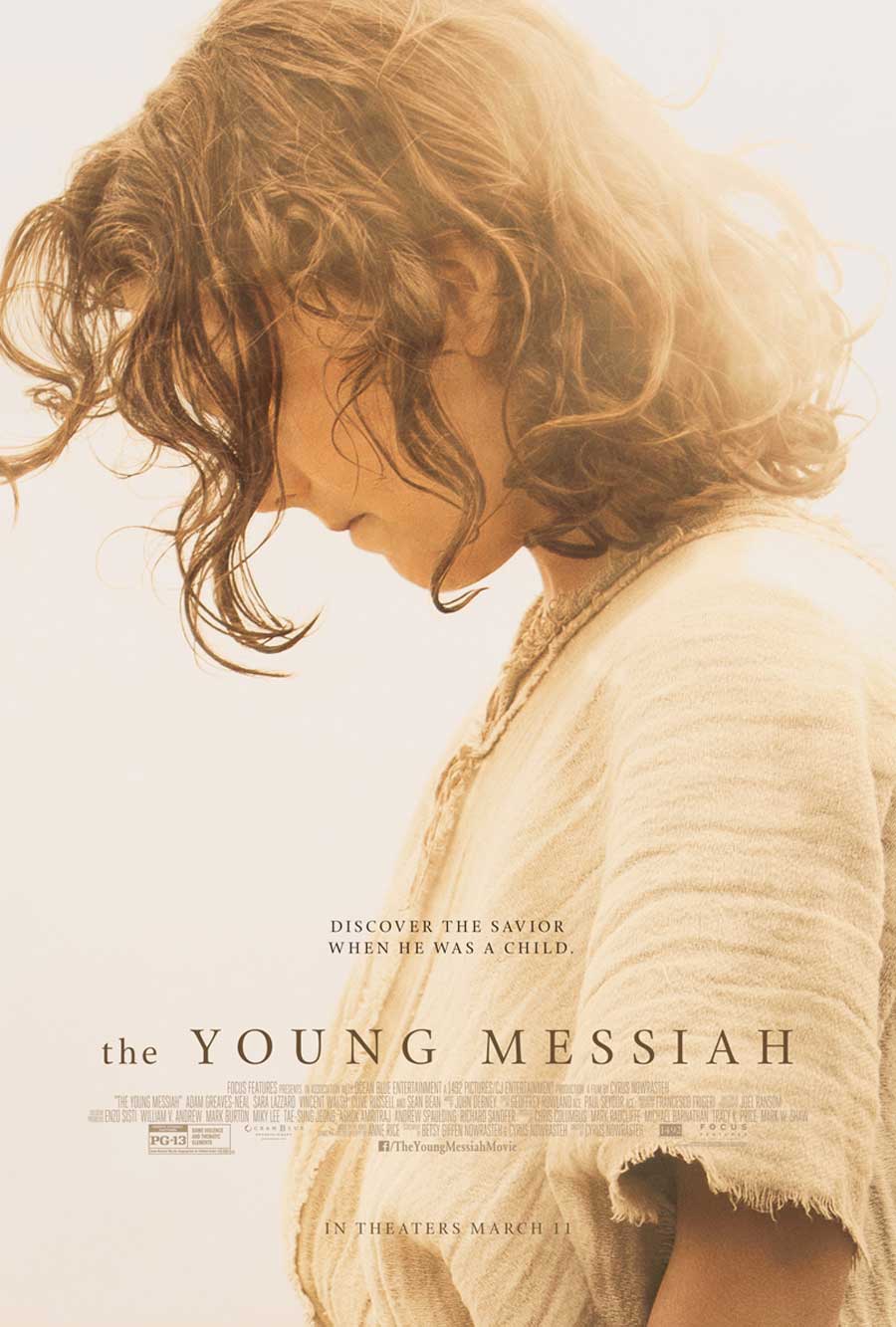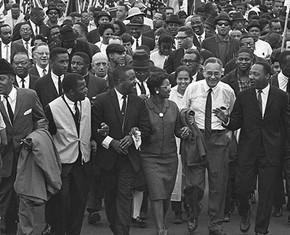The views expressed in our content reflect individual perspectives and do not represent the authoritative views of the Baha'i Faith.
I love watching films about religion and spirituality.
When I went to see The Young Messiah recently, the theatre only held 12 adults out of its 120 seats, including myself and my movie buddy Richie. It was a far cry from the packed houses for action thrillers with car chases and shoot-em-ups, or the sci-fi flicks with the word “Star” in their titles. That’s a pity, because films about religion and spirituality can really open your mind and heart to the reality of how humans initially treated the great founders of Faith. They can even deepen your own experience of the spiritual.
For example: The Young Messiah tells a bible-based but fictional account of the young Son of God, and the dangers Jesus and his family faced from the clergy, political leaders and Roman centurions. The trials and tribulations faced by all the prophets of God from time immemorial would have crushed mortal men:
God has sent all His messengers and Prophets to establish love amongst humanity. All the Heavenly Books are written for the sake of Love. All the prophets have borne trials and martyrdoms in order that Love may become established in the hearts of the children of God. The wise men and philosophers of every age have suffered and endured so that this Love might become reality. – Abdu’l-Baha, Star of the West, Volume 3, pp. 88-89.
 Just so in this young Christ at the turn into the first millennium. Displays of his godly powers caused fear, fear that they were the devil’s work. The film shows us an innocent young boy of six, hunted from birth by an order to kill from the maniacal King Herod, grappling with all the natural questions every child has about their being and purpose. Even though we know Christ’s ultimate purpose—personal salvation, exhibited through his later example, teachings, death and resurrection—this young actor was mesmerizing in his genuineness and that of his holy parents, as well.
Just so in this young Christ at the turn into the first millennium. Displays of his godly powers caused fear, fear that they were the devil’s work. The film shows us an innocent young boy of six, hunted from birth by an order to kill from the maniacal King Herod, grappling with all the natural questions every child has about their being and purpose. Even though we know Christ’s ultimate purpose—personal salvation, exhibited through his later example, teachings, death and resurrection—this young actor was mesmerizing in his genuineness and that of his holy parents, as well.
The dialogue and scenes are all appropriate and impactful, moving this gripping story along to Jesus’ discovery and imminent death at age seven in the courtyard of the Temple. Most importantly, the last scene where we hear the young prophet run and shout for life creates the perfect climax. If you think of yourself as spiritual in any way, you’ll want to see this movie. If it’s not showing near you, and you can’t find it on Netflix or elsewhere, pick up a copy of Anne Rice’s 2005 novel Christ the Lord: Out of Egypt, the basis for the film.
All this brings me to the major spate of religious films during these past few years. Did you experience 2014’s Exodus: Gods and Kings starring the incomparable Christian Bale as Moses and the dynamic Joel Edgerton as the unforgettable Rameses II? This epic film—which shows us the Seven Plagues, the flight from Egypt by the Jews, and the parting of the Red Sea—presents a Moses few have ever experienced before. I rooted for his humanity throughout, and I came away understanding a little more about how badly humanity has treated the prophets of God.
Exodus: Gods and Kings tells the story of a prophet looking for peace, security and well-being—what we all wish for in a war-free world someday. However, Exodus and many other films about God’s messengers make it clear—just like the Baha’i teachings do—that we won’t get there without God in our lives and behaviors:
The well-being of mankind, its peace and security, are unattainable unless and until its unity is firmly established. This unity can never be achieved so long as the counsels which the Pen of the Most High hath revealed are suffered to pass unheeded. – Baha’u’llah, Gleanings from the Writings of Baha’u’llah, p. 286.
My recommendations for spiritual films wouldn’t be complete without including the serious, historical look at Muhammad titled The Message, starring Anthony Quinn as his defender Hamzah. That movie—originally titled Muhammad: Messenger of God (not to be confused with the new 2015 film)—transformed my view of Islam.
Someday I’ll publish my book of religious movie reviews. But until then, the point I’m trying to make is that movies about the prophets of God can be wonderful, emotionally moving and convincing stories of religion in real life.
All in all, these kinds of films do one thing for me: help me question my relationship to God, whatever be His name, and in whatever reality He shows Himself.
You May Also Like
Comments

















Okay, back to films. Last time, I forgot to mention The Little
Buddha staring Keanu Reeves. It's one of the few English language films (as in the original language, not dubbed over) from my category on films on the Buddha. I was mentioning all the imported stuff I watched with English subtitles last time and forgot the original English language stuff. I also look forward to parts 3 and ...above in this series. Also, in The Little Buddha, I should note that rather than being a movie about the life of the ?Buddha, it's a story within the story of the main plot. The main plot is related to the Tibetan tulku system, but it is kind of used as a framing device for the parts about the life of the Buddha.
Narakas/Hells, Animals/Animality/Brutality, Pretas/Ghosts/Hunger, Humans/Humanity/Passionate Idealism, Asuras/Anger/Arrogance, Devas/Heaveans/Rapture, Shravakas/Learning, Pratyekas/Realization, Bodhisattvas, and ?Buddhas are the summary of karmas, it causes via the ten spiritual realms, and its effects in the Buddhist cosmology. Also, religious and spiritual films remind me of it via various characters, their characterizations, and their various points on the spectrum in general and in each moment. The first six are parts of samsara and the next three are closer to nirvana while the tenth is fully in nirvana. In the Buddhist cosmology, we are all in the human world right now. But, in our minds, which of the ten spiritual realms are we experiencing at any given time or most of the time? Religious and spiritual films make me ask myself that question. I ranked the spiritual realms in order from bottom to top, but sometimes animals and Pretas or humans and Asuras places are swapped, but the overall ranking is the same for the rest.
On books, Hermann Hesse and Osamu Tezuka's have written a novel and a manga series on the life of the Buddha. The latter was turned into a film a couple of years ago with got a sequel recently as well. Osamu Tezuka is also known as the most famous mangaka (manga author) ever!
As a Mahayana Buddhist, I'm a fan of films and media about Boddhisattvas and Bodhisattva like individuals whether Saint Francis of Asissi or Mother Teressa or anyone else like them. I'll put some films about Jesus on my to watch soon list as well. I think I saw an independent film about Jesus a Mormon friend of mine recommended once, but none of the really big popular films about Jesus have been ones I have watched yet.
What spiritual realm out the ten is most reflected in our lives, behavior, thoughts, words, actions, feelings, beliefs, etc? How can we elevate the most habitual spiritual realms we tend to inhabit? How can we become Shravakas, Pratyekas, Bodhisattvas, and Buddhas?
I would also like to give a shout out to the Bollywood film OMG about a lawsuit against God and his representatives on Earth due to someone's insurance and acts of God. It's really good and a Hindu spin on the lawsuits against God genre of films. Krishna appears in the film to teach the main character about religion and spirituality. There are many more films like that, but I have minimal knowledge about Bollywood films. There is Dashavatara, a Bollywood film about all ten major avatars including both Krishna and Buddha. Again, I'm not a Bollywood expert. I have some friends who are into Bollywood way more than men, so I know some Bollywood, but not a lot.
Movie with the word Star in it like the Star Wars series do have religious and spiritual undertones even not being films about religion and spirituality. The older Dune movie and book series counts as well as the Artemis Fowl book series. Stargate television series and movies also qualify as this to a lesser extent.
http://en.wikipedia.org/wiki/Mediation_in_popular_culture
That's where more films and tv series as well as book than I listed are given as examples like my Artemis Fowl series example.
Nichiren Daishonin as well a being a prolific writer on Buddhism and starter of the Nichiren Buddhism school of Mahayana Buddhism, ocassionly wrote on Confucianism, Daoism/Taoism, and Brahmanism (the predecessor religion of modern day Hinduism). He wrote positively of them saying that saints and sages are universal to them and other systems of thought. People in East Asia practice triple religion a fusion of Confucianism, Daoism/Taoism, and Buddhism with other religion sometime thrown in as well in places other than China/Taiwan, like Korean shamanism and Cheondogy in Korea, Shinto and Tenrikyo in Japan, Vietnamase shamanism and Cao Dai in Vientman, etc.